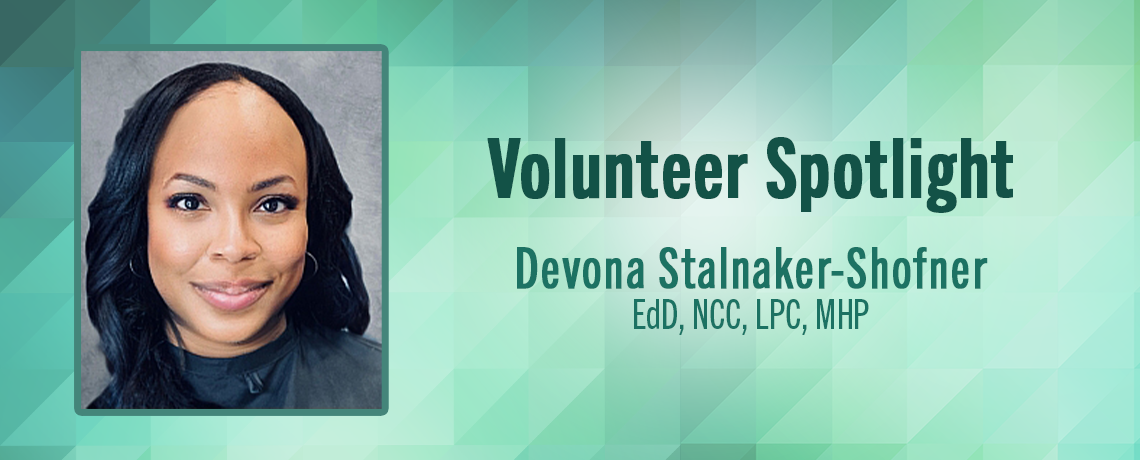
Foundation Connections

Volunteer Spotlight: Leading by Example
Published 6/22/2021
Dr. Devona Stalnaker-Schofner's relationship with NBCC began over 20 years ago when she became a National Certified Counselor (NCC). During her time as an NCC, she was introduced to the NBCC Foundation’s Minority Fellowship Program (MFP) and was impressed by the Foundation’s efforts to recognize and work with marginalized populations with the intentionality of finding future clinicians committed to serving them. Driven by her professional experiences working with these populations, she decided to join the NBCC Foundation as a volunteer mentor.
Citing the lack of mentoring during her education, she wanted a better experience for counselors-in-training and for future counselor educators. Dr. Stalnaker-Shofner desires to give back in a meaningful way that allows for mutual growth of both mentor and mentee. She shares, “As much as they are giving, I am receiving and learning from them,” referring to her past and current fellow mentees. She believes mentoring helps prepare fellows for what their work will be like as future counselors and how to be a supported person when they are overwhelmed.
In addition to being an NBCC Foundation volunteer mentor, Dr. Stalnaker-Shofner strives to live a service-oriented life through other volunteer positions she has held with a local Key Club and a rape crisis program near her home. She shares that volunteering within the profession of counseling is an extension of who she is as a counselor.
She currently works as an associate professor and associate chair in the clinical mental health counseling department at Antioch University New England while also running her own private practice. She received her Doctor of Education in counselor education and supervision from Argosy University Atlanta with dissertation research focused on wellness in graduate students as they transition to counselors-in-training and during clinical practicum.
As a clinician who has also worked with incarcerated males and adolescents with substance abuse disorder, her experiences highlighted the need for reform and increased mental health care services in the criminal justice and penal system. Inspired by her desire to advocate for those populations, Dr. Stalnaker-Shofner believes in fighting for clients and favors a non-punitive approach for those who continue to struggle with substance abuse.
During the pandemic, Dr. Stalnaker-Shofner felt the pull to create a space for students at her university to come together and talk about their experiences with racism and systemic oppression due to the heightened social justice issues in the United States. This work culminated into a presentation at the Law and Ethics in Counseling virtual conference this past March.
Noting how hard it was to remain engaged over the past year and a half, she learned to give herself grace and recommended that her students and mentees do the same. She shared with them that it was “OK to be overwhelmed and unplug from news and social media.”
However, it is her commitment to social justice and being the change she wanted to see that motivated her to keep herself and her students engaged while still remembering to care for themselves. This commitment to justice resulted in her accepting a second MFP Fellow mentee, which is no small task, as MFP Fellow mentors are responsible for aiding fellows in reaching their yearlong program goals and playing a significant role in their professional development. Knowing how important it is to have a mentor, Dr. Stalnaker-Shofner says she was grateful for the opportunity to help an additional counselor-in-training.
Dr. Stalnaker-Shofner recently completed a presentation for the American Mental Health Counseling Association and will present at this year’s NBCC Foundation Bridging the Gap Symposium and NAADAC’s Virtual Annual Conference. She also has an article set to be published later in 2021 titled “Colorism and the Racial Identity Development of African American Women: An Autoethnographic Depiction” in The Journal of Black Sexuality and Relationships, Special Issue: Black Sexuality Matters.
The NBCC Foundation is currently seeking volunteer mentors for both the Minority Fellowship Program and for NBCC Foundation military and rural scholars. Volunteers must be National Certified Counselors with at least two years of post-master’s or postdoctoral experience. All mentoring communication is done remotely through electronic means.
For more information about becoming an NBCC Foundation volunteer or to submit an application, visit NBCCF.org/BeInvolved or email foundation@nbcc.org to connect with our Volunteer Coordinator.

